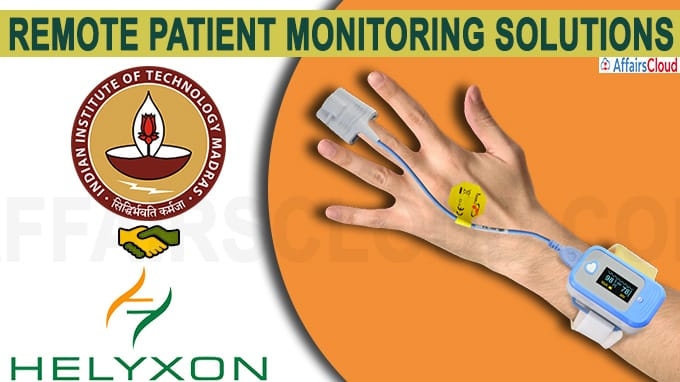
By IT Correspondent
New Delh, August 12:
A healthcare start up at IIT-Madras and HELYXON, have developed the devices called OXY2 which serve as a remote patient monitoring solution and act as a force multiplier in the healthcare system.
The device is completely self-contained, portable, wireless and can be clipped on to patient’s finger and data is streamed to a mobile phone(via Bluetooth) or central monitoring system(from phone to system via the internet). The temperature is measured at the user’s armpit, whereas blood oxygen level, and other parameters are measured at the finger.
As COVID-19 cases continue to rise, demands for miniaturized, affordable and clinically accurate devices for monitoring health parameters such as temperature, oxygen saturation, respiration rate and heart rate has been also been rising. The IIT-Madras has started providing such indigenously-developed devices to government and private hospitals.
The device which is powered by a coin-cell battery is meant to serve as a replacement for large patient monitors that are used in hospitals, for a fraction of the cost. “This is a medical device that replaces large patient monitors that cost about 1lakh Rupees. While there are many similar offerings in the market, our devices can provide clinically accurate results. With remote monitoring, the doctors and healthcare staff can get the results without even getting anywhere near the patients,” Prof Mohanasankar Sivaprakasam, Healthcare Technology Innovation Centre (HTIC), IIT Madras said.
Priced between Rs.2500 -10,000, depending on which of the four parameters they can measure and how the device is configured, they can be used at home, hospitals, COVID care centres and other facilities, as it can be easily worn. When in close proximity to a smartphone, the Bluetooth-enabled device would show the physiological parameters on a dedicated app on iOS or Android. There is the option to fix a threshold to the parameters and in case of a breach, it can be notified to the emergency contacts. Likewise, remote monitoring is also possible, thus making it possible for a centre to measure data from hundreds or thousands of individuals.
When asked about the certification and validation process for the device, Prof. Sivaprakasam said that it is CE certified as a safe electronic device. ”This is a non-invasive device and since the safety is proven and validated it is free to be marketed. There is no special certification for no-invasive devices in India. But we have tested out results with the larger machines that are used in hospitals and found the results to be very reliable” .
The device can be used by vulnerable groups, Covid-19 patients, and those who have even recovered from the virus, just to be sure and safe of their parameters, all through the day, without needing to risk visiting a hospital, he added.



